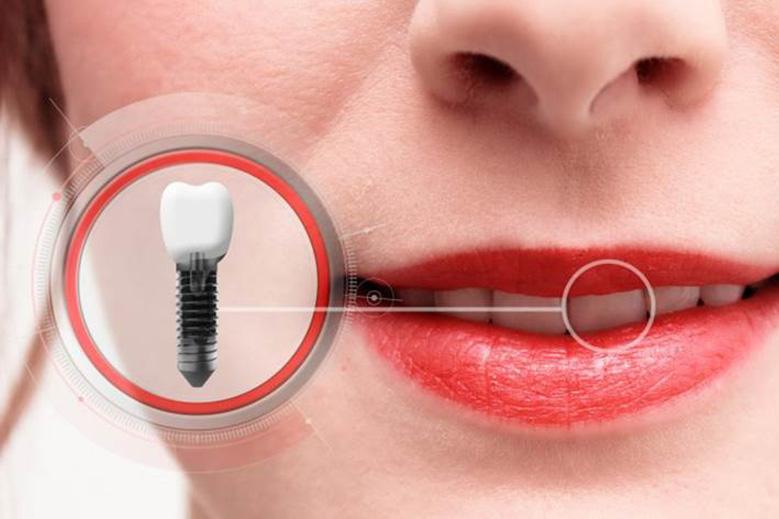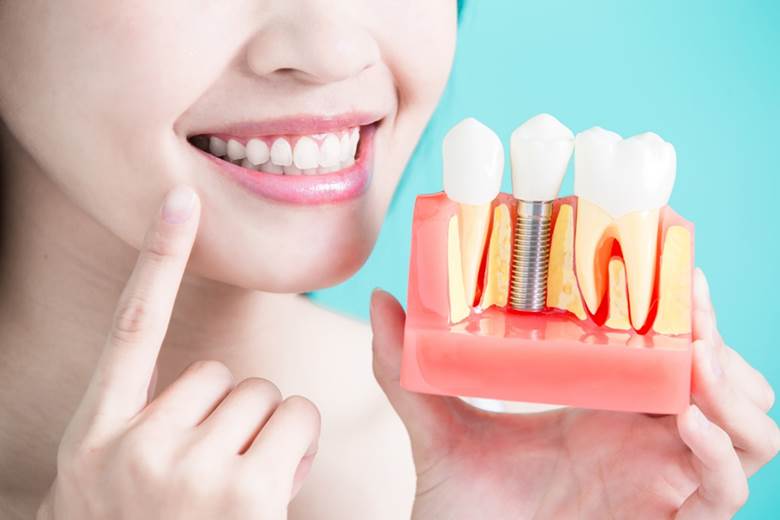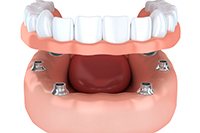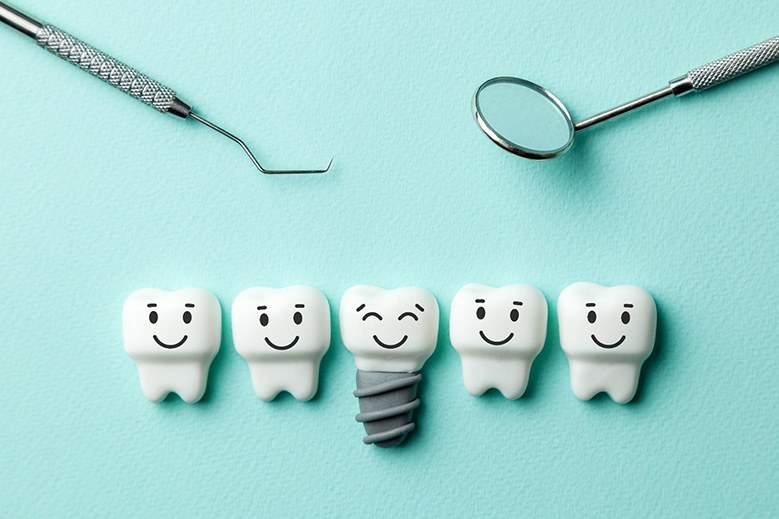Why Choose Rabbit Hill Family Dentistry For Dental Implants?
- #1 Entire Dental Implant Treatment Completed Under 1 Roof
- #2 Replace Any Number of Missing Teeth
- #3 Dental Implants Can Last a Lifetime
What Are Dental Implants?
A dental implant is a small titanium post that can be inserted into your jawbone where a tooth once was. Titanium is biocompatible, so the post will fuse with the bone tissue to essentially replace the roots of the missing tooth. This provides a strong, stable foundation for the restoration it supports. One or more dental implants can be placed throughout the mouth to support a crown, bridge, partial, or full denture in order to replace any number of missing teeth. Dental implants are the only tooth replacement option designed to replace the root structure of a missing tooth, making it the most lifelike and reliable choice.
The 4 Step Dental Implant Process

The process of getting dental implants in Edmonton requires a multi-step process. Luckily, we’re able to perform the entire treatment from start to finish in one convenient location because our dentists have undergone advanced training. While dental implants require a longer and more involved process than traditional forms of tooth replacement, they are well worth the effort. Every step is key for ensuring your dental implants are as durable, comfortable, and long-lasting as possible.
Initial Dental Implant Consultation

First, you’ll need to visit us for a consultation to ensure that dental implants are right for you and complete any necessary preliminary treatments. At Rabbit Hill Family Dentistry, we’ll review your medical history and assess the current state of your oral health during your appointment. If you have any underlying issues that need to be addressed, we’ll work with you to complete any procedures like gum disease therapy, bone grafting, or tooth extractions. Once you’re good to go, you can schedule your dental implant surgery.
Dental Implant Surgery

As mentioned earlier, we’ll perform your dental implant placement surgery right here in our Edmonton office. The procedure is actually fairly simple! Before doing anything, we’ll numb your mouth to ensure you’re completely comfortable. Then, we’ll make small incisions in your gum tissue to access the jawbone. Each implant will be surgically inserted at precise locations and angles. After we suture the gums shut, we’ll place a protective cap over the implants to keep them safe throughout the healing process.
Dental Implant Osseointegration & Abutment Placement

Over the following three to six months, the implant will fuse with the jawbone via a natural process called osseointegration. It’s what makes dental implants in Edmonton so reliable! After that process is complete, you’ll return to our office for a second minor surgery to receive your abutments. These small metal connector pieces are attached to your implants, allowing us to secure your custom-made restoration into place.
Delivery of Dental Implant Restorations

Finally, you’ll return to our office to have your final crown, bridge, or denture anchored in place. Since they’re designed based on impressions of your natural smile, they’ll blend seamlessly with your remaining teeth. Once in place, you’ll be ready to enjoy your newly rebuilt grin!
Benefits of Dental Implants

Often considered the gold standard for replacing missing teeth, dental implants in Edmonton are one of the most desirable tooth-restoration options available due to their ability to replicate natural teeth in terms of look, feel, and functionality! Thanks to their surgical placement inside the jawbone, this modern solution provides a vast array of impressive benefits that you simply don’t have access to when it comes to other options like dentures or bridges. Keep reading below to learn more about these incredible benefits and how dental implants vastly improve your smile and quality of life.
Day-to-Day Benefits

Your smile is one of the first things that people will notice about you, and dental implants will certainly allow you to show off your pearly whites to the whole world. Here are some of the advantages they can offer your daily life:
- The ability to eat most foods – Since dental implants replace the entire structure of missing teeth from the roots to the crown, they provide more stability than dentures or bridges. This means they can withstand virtually any type of food. In fact, dental implants restore a significant amount of your natural chewing power!
- Increased confidence – Implants are carefully designed and customized for your individual smile, so they’ll compliment your natural facial aesthetic while resembling your natural teeth. This will work wonders for your self-esteem; you won’t want to stop smiling throughout the day!
- Improved speech – It’s not uncommon for patients with dentures to experience some difficulties with speech, due to their prosthetic sliding around their mouth. But since dental implants are secure, you’ll be able to speak clearly and confidently.
- No specialized maintenance required – Dental implants are relatively easy to care for; you simply need to brush and floss them like your natural teeth! There’s no need to remove or soak them in a special solution, as with dentures.
Health Benefits

Dental implants can also provide you with several noteworthy health benefits, such as:
- Improved overall health – Studies have revealed a connection between tooth loss and an increased risk of several diseases, but since implants are the next best thing to natural teeth, it’s reasonable to assume that they might also help to lower these risks.
- Protection for surrounding teeth – Dental drift, or the shifting of teeth, is quite common in patients with missing teeth. However, dental implants can serve as placeholders to ensure your remaining teeth stay in their proper positions. It’s also worth noting that in some cases, traditional restorations like dentures or bridges can place strain on the surrounding teeth and gums due to how they’re stabilized. But since implants support themselves, this isn’t an issue with them!
- Jawbone preservation – Dental implants provide the jawbone with a healthy amount of support, which actively prevents the bone loss that commonly results from missing teeth. This also helps you retain facial structure.
Long-Term Benefits

Designed to function as a permanent solution for missing teeth, dental implants are also accompanied by several long-term benefits, including:
- Impressive longevity – As opposed to other solutions like dentures or bridges, dental implants are built to last; they can easily serve you well for several decades if you take care of them. This also means they’re cost-effective as time goes on, since they won’t need to be replaced.
- High success rate – Dental implants have an amazing success rate of 95% to 98%, even holding true after 10 years.
- Youthful appearance – Believe it or not, dental implants actually make you appear younger! Since they provide a healthy level of stimulation for your jawbone, they ultimately prevent it from deteriorating and giving your face a sunken appearance.
Who Dental Implants Can Help

We often recommend dental implants in Edmonton to help our patients replace their missing teeth due to the fact that the treatment is incredibly versatile; whether you’ve lost just one tooth or an entire arch of teeth, dental implants can easily make your smile whole once more! After we’ve examined your mouth, we’ll be able to determine whether dental implants are the best solution for you and put together a personalized treatment plan based on your needs.
Who Is a Good Candidate for Dental Implants?

Most healthy adults with missing teeth are candidates for dental implants, which explains in part why they’ve become such a popular option for tooth replacement. The most common issues which would prevent a patient from being a viable candidate include lack of bone support or excess space between existing teeth. However, we can recommend dental implants if:
- You’re relatively healthy – Since dental implant placement is a minor surgical procedure, you’ll need to be healthy enough to undergo it.
- Your mouth is in good shape – Issues like cavities and gum disease can potentially cause dental implants to fail, meaning they’ll need to be treated beforehand.
- Your jawbone density is sufficient – It’s essential that your jawbone is strong enough to support dental implants in order for them to ultimately last.
In some instances, preliminary procedures such as periodontal therapy or dental bone grafting might be needed before a patient can receive dental implants. We’re happy to help you schedule these preparatory procedures (if they’re deemed necessary) to get you on track for receiving your new smile!
Missing One Tooth

If you have just one missing tooth, we can place a single implant in the space where it used to be. Once it’s fused with your jawbone, we’ll be able to restore the lost tooth with a crown that’s been customized specifically for your smile. These implant crowns are often sturdier than traditional dental bridges and can even potentially last for decades. They look and feel so natural that you might even forget which tooth you’ve had replaced!
Missing Multiple Teeth

For patients missing two or more teeth in a row, an implant bridge is often utilized. This involves a pair of implant posts being placed before a special dental bridge is anchored to seamlessly fill in the gap and restore your smile’s functionality. In cases where teeth are missing in different parts of your mouth, dental implants can also be used to support a partial denture, although the exact number of implant posts needed will depend on your needs.
Missing All Teeth

If you’ve lost all of your teeth, implant dentures can be utilized; this treatment consists of 4 to 6 strategically placed dental implants that are capable of supporting a full denture. Often, implant dentures are designed to stay in your mouth at all times, meaning that you can brush and floss them as you would your natural teeth. This also means you won’t have to deal with your teeth slipping and sliding around your mouth, thanks to the stability provided by the implant posts.
Understanding the Cost of Dental Implants

Even if you want implants, you might worry that their price is too high. After all, replacement teeth won’t do much good if you can’t afford them. The truth, though, is that the cost of dental implants in Edmonton varies by patient. You’d thus need to consult in person for an exact treatment estimate. That said, we at Rabbit Hill Family Dentistry would work to ensure your bill is affordable — no matter the cost factors! If you’d like to learn more, keep reading or contact us for details!
Preliminary Treatments & Dental Implant Surgery

Depending on your situation, you may need preliminary care before implant surgery. Things like gum disease therapy, tooth extractions, or bone grafting could ensure your treatment’s success. Still, remember that such procedures add to your overall expense.
Of course, various factors can also impact the price of implant surgery itself. The cost can rise or fall based on the implants’ location, the anesthesia used, etc. Luckily, our office provides treatment in-house, so you won’t have to worry about paying an outside specialist for care.
The Parts of Your Dental Implant

Even your implants’ components can impact the final bill. For instance, consider the following:
- Number of Implants: A single implant will cost less than four to six for an implant denture. Granted, the latter option is more cost-effective than replacing teeth separately.
- Implant Size & Material: Certain implants are made longer or shorter depending on their placement. Similarly, some are made of zirconia instead of titanium.
- Implant Brand: Different manufacturers make implants differently, enabling them to meet various patients’ unique needs.
How Dental Implants Can Save You Money

Given their lower initial price, you might be tempted to get dentures or bridges instead of implants. However, the latter option’s one-time expense makes it more cost-effective in the long run.
You see, implants don’t require constant replacement or adjustment. Their features allow them to last for 15 years or more! As a result, you don’t need to pay for much follow-up care when it comes to them. Plus, implants prevent oral health issues and thus avoid adding to your preventive expenses.
In contrast, dentures or bridges need costly maintenance despite their low upfront price. They often need replacing, not to mention various pastes and cleaning solutions.
Does My Dental Insurance Cover Dental Implants?

While public insurance covers much of Canada’s health care, out-of-pocket expenses play a strong role in its dental care. As such, it’s unlikely that a private insurer will cover an implant’s costs.
Of course, there are exceptions. Portions of your treatment may be covered, whether a percentage of your final restoration or some of your preliminary care. Therefore, make sure to talk with your policy provider beforehand.
Making Dental Implants Affordable

Even if you lack dental insurance, there are other ways to make implants affordable. It all depends on the options provided by a dental practice.
Consider our own Rabbit Hill Family Dentistry, for example. We offer flexible financing, which allows patients to pay for treatment in monthly installments. That way, you can cover the cost of implants over time instead of all at once.
Dental Implant FAQs

If you’re missing teeth, dental implants could be the solution that you’ve been looking for. However, they are quite an investment, so it pays to be well-informed. Here are the answers to some of the most popular questions we are asked about dental implants in Edmonton. If you don’t see the information that you’re looking for below, don’t worry. Just give us a call! We’d be happy to explain more about the procedure and get you started with an initial consultation.
How Long Do Dental Implants Last?
The lifespan of dental implants typically depends on the health and lifestyle choices of the patient. To ensure that implants last, it’s important that you brush, floss, and rinse with mouthwash on a daily basis. Attend regular checkups and avoid chewing on anything particularly hard or sticky. With proper maintenance, dental implants can last for upwards of three decades! That’s several times longer than traditional bridges and dentures.
Does Getting Dental Implants Hurt?
The jawbone doesn’t have very many nerve endings, and your mouth will be numbed with a local anesthetic before the procedure begins. You will also most likely be sedated, lowering your body’s ability to register pain. While the surgery shouldn’t be painful, you may experience some soreness for a few days afterward. Take prescribed and over-the-counter pain medication as directed. Cold compresses can also help. If your discomfort worsens instead of improving after a few days, give us a call!
How Successful Are Dental Implants?
When placed by a skilled professional, dental implants can have a success rate of over 95%. The success rate of your implants will depend on how well you care for them with oral hygiene, routine checkups, and lifestyle choices. Success can also vary based on the location of the implant. For instance, molars receive more strain from chewing than front teeth, so they may be slightly more likely to fail.
Am I Too Young to Get Dental Implants?
Most dental professionals will not place implants in patients younger than 18. This is because if dental implants are placed before the jaw has finished growing, it could interfere with further bone development and potentially result in complications. Most people’s jaws aren’t fully developed until young adulthood, and some people’s jaws take until their mid-20s to develop. In general, men’s jaws take longer to develop than women’s jaws. During your consultation, we will determine if dental implants are the right option for you at this time.
Maintaining & Caring for Your Dental Implants
Dental implants can last for upwards of 30 years or even the rest of your life if you are taking all the right steps to care for them. If you aren’t taking the time to protect your dental implants from becoming damaged, they could end up failing and needing to be replaced. The good news is that with just a few simple precautions, you can keep your implants healthy and enjoy their benefits for numerous years down the road.
Making Oral Hygiene a Priority
Dental implants cannot get cavities themselves, but you should still practice excellent oral hygiene. In addition to keeping your surrounding teeth in good shape, sticking to an excellent oral hygiene routine can prevent other dental problems, like gum disease, that can cause your implants to fail. Remember to brush, floss, and rinse with mouthwash every day.
Eat a Healthy Diet
One of the many benefits of getting dental implants is the fact that you won’t have any restrictions. You can easily enjoy nutritious meals without struggling to chew. Just remember that enjoying too many foods that are hard, sticky, or sugary can be problematic for your oral health, so it still pays to be cautious.
Break Bad Habits
Refrain from smoking or using tobacco products immediately after your dental implant placement procedure. This can slow down healing and increase your risk of developing an infection. Don’t use your teeth as tools either. You could end up accidentally damaging your dental implants or surrounding teeth. Instead, try to find some scissors, pliers, a bottle opener, or another tool that can help you complete your task safely.
Protect Your Dental Implants
Your dental implants may be strong, but they aren’t indestructible. You should always wear a mouthguard to protect your dental implants and natural teeth when participating in sports. If you grind your teeth at night, ask about a nightguard to protect your implants from additional wear and tear.
Schedule Regular Dental Checkups
You should always attend regular cleanings and checkups twice a year. This way, we can monitor your dental implants and spot any issues as easily as possible. By catching potential problems now, you can keep them from becoming more serious and leading to greater consequences.